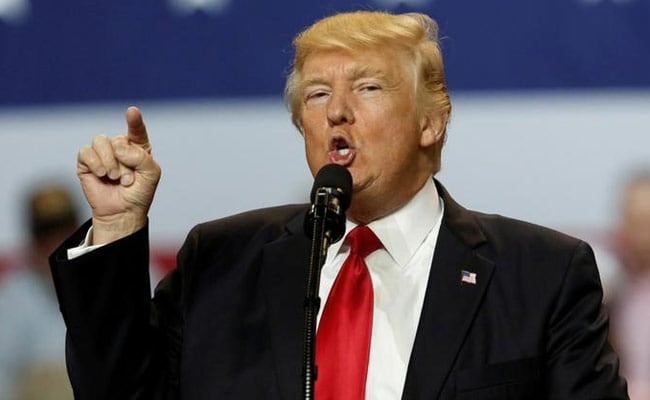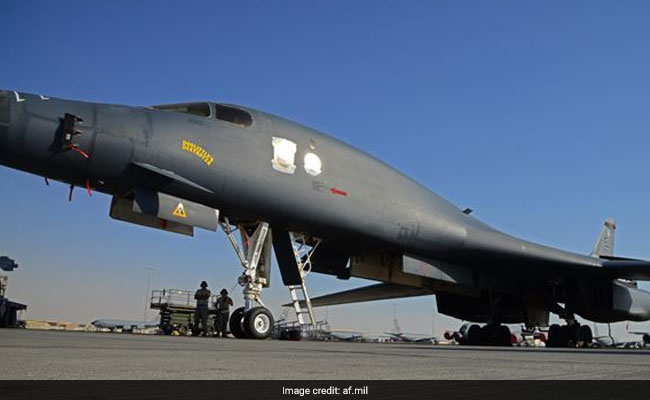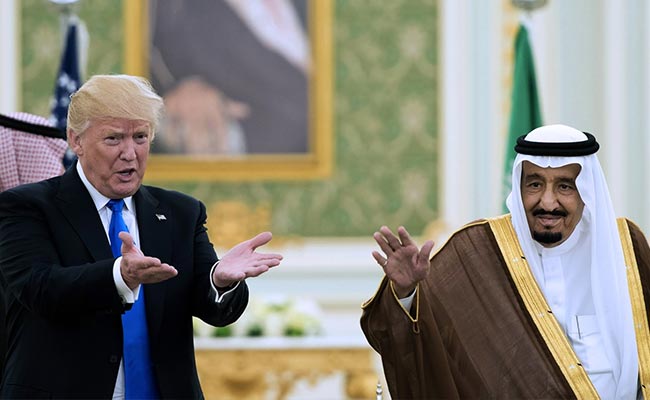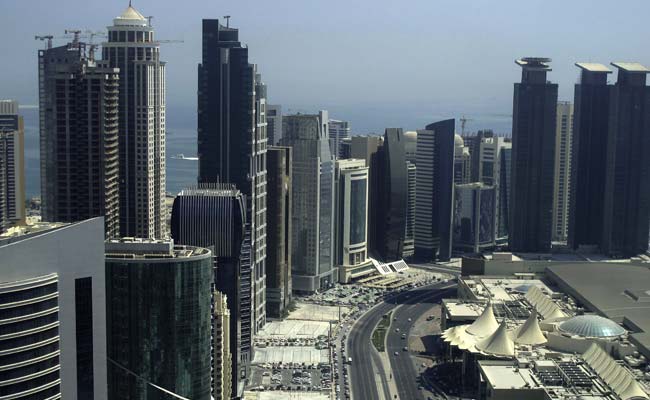
Donald Trump tweeted that he had said that there can no longer be funding of Radical Ideology.
Trump administration officials said Tuesday that President Trump was not "taking sides" in the deepening dispute among its key counterterrorism partners in the Persian Gulf, despite a morning of presidential Twitter posts congratulating Saudi Arabia - and himself - for cracking down on Qatar for alleged terrorism financing.
"During my recent trip to the Middle East, I stated that there can no longer be funding of Radical Ideology," Trump tweeted. "Leaders pointed to Qatar - look!"
"So good to see the Saudi Arabia visit with the King and 50 countries already paying off," he continued. "They said they would take a hard line on funding extremism, and all reference was pointing to Qatar."
On Monday, several of Qatar's gulf neighbors - Saudi Arabia, the United Arab Emirates and Bahrain - were joined by Egypt and smaller nations in severing diplomatic ties with Qatar, ordering its diplomats and citizens to leave and threatening deeply intertwined regional trade links and air routes.
The eruption appeared motivated by years-long regional disputes rather than any recent disagreement or action. It followed a late-May visit in which Trump, while calling on the Arab and Muslim worlds to unite against the terrorist threat, heaped praise on Saudi Arabia as the regional leader.
Secretary of State Rex Tillerson, in New Zealand, called for dialogue among the neighbors. At the State Department, spokeswoman Heather Nauert said that "we recognize that Qatar continues to make efforts to stop the financing of terrorist groups, including prosecuting suspected financiers, freezing assets, introducing stringent controls into its banking system. They have made progress . . . but we recognize there is more work to be done."
"Let's move off this social-media thing," Nauert said of numerous questions about Trump's tweets, "because there are a lot of other important things that we need to discuss."
A senior administration official said: "We're not taking sides. If we are taking sides, we are taking the side of unity and cooperation" against terrorism. The official spoke on the condition of anonymity to discuss the sensitive diplomatic issue.
Nauert and the senior official said the United States had been notified of Saudi Arabia's intention to break relations, shortly before it was announced Monday. But "I don't think the U.S. government has perfect clarity on what triggered that," the official said. "We know there have been issues between them."
The Pentagon, whose air operations for the Middle East are headquartered at a massive air base in Qatar where at least 10,000 U.S. service members are stationed, opted for balance and calming words.
 "We recognize that there are differing views in the region that have gotten us to this point," it said in a statement. "United States and the Coalition are grateful to the Qataris for their longstanding support of our presence and their enduring commitment to regional security. We have no plans to change our posture in Qatar."
"We recognize that there are differing views in the region that have gotten us to this point," it said in a statement. "United States and the Coalition are grateful to the Qataris for their longstanding support of our presence and their enduring commitment to regional security. We have no plans to change our posture in Qatar."
The statement said that restrictions Qatar's gulf neighbors have imposed on Qatari movements in and out of the region "have not impacted our air operations," including missions in Iraq, Syria and Afghanistan.
Sen. Bob Corker (R-Tenn.), chairman of the Senate Foreign Relations Committee, shook his head in a Capitol hallway when shown Trump's tweets on a reporter's cellphone. "Each of these countries are people that are important to our country," he said. "Our general policy as America has been to work with each of them."
"We do have a base there that we operate out of that's very important," he said of Qatar.
During last month's visit to Saudi Arabia, where he delivered a speech to dozens of leaders from Muslim-majority nations gathered for the occasion, Trump met personally with Qatari emir Sheikh Tamim Bin Hamad al-Thani. "We are friends. We've been friends now for a long time. . . . Our relationship is extremely good," Trump said at the beginning of the closed-door meeting. "One of the things we will discuss is the [Qatari] purchase of lots of beautiful military equipment."

In New Zealand on Tuesday, Tillerson emphasized that all countries in the gulf region "have their own challenges to live up to that commitment to terminate support for terrorism, extremism, however it manifests itself anywhere in the world. And I would say that's true of all the GCC countries; they have their own work to do in that regard."
The GCC is the Gulf Cooperation Council, whose six members - Saudi Arabia, Bahrain, the UAE, Kuwait, Oman and Qatar - signed a communique with Trump pledging to continue their joint fight against terrorism. The visit also culminated in what the administration said was $110 billion in arms sales to Saudi Arabia.
Small but influential Qatar has long been at odds with some of its regional neighbors over its support for the Muslim Brotherhood, which is seen by Saudi Arabia and other nations as a threat to the network of ruling monarchs and others across the region.
Qatar, the world's largest exporter of liquefied natural gas, also flexed its political influence by using its energy wealth to become a key patron of groups such as Hamas in the Gaza Strip and, in the mid-1990s, to launch the Al Jazeera media network, which has wide reach through the Arab-speaking world.
U.S. officials who monitor terrorist funding have said that gulf governments have made significant strides in ending official support for terrorist groups, although some money still flows from individuals, primarily in Kuwait and to a lesser extent from Qatar.
Saudi Arabia also has come under scrutiny for indirectly backing militant networks through groups promoting the Saudis' strict Wahhabi interpretation of Islam.  Gerd Nonneman, a professor of international relations at the Doha campus of Georgetown University, one of a number of U.S. universities with branches in the Qatari capital, said the dispute was fueled by "irritation" in Saudi Arabia and the UAE "with Qatar's independence of mind in foreign policy, including its support for the Arab Spring movements."
Gerd Nonneman, a professor of international relations at the Doha campus of Georgetown University, one of a number of U.S. universities with branches in the Qatari capital, said the dispute was fueled by "irritation" in Saudi Arabia and the UAE "with Qatar's independence of mind in foreign policy, including its support for the Arab Spring movements."
Qatar's backing for the Muslim Brotherhood and other Islamist organizations, Nonneman said in an email, has been driven by "a pragmatic calculation that these movements had considerable social traction and would likely become an important part of the post-Arab Spring era." Qatar, he noted, "also refused to join the campaign to fully isolate Iran . . . even while it furiously disagreed with Iran's policies in Syria."
The desire to isolate Iran, in addition to the fight against terrorist groups such as the Islamic State, has brought the Trump administration closer to Saudi Arabia and the UAE. The administration has considered designating the Muslim Brotherhood a terrorist group, although it was dissuaded from immediate action by other Arab leaders, including King Abdullah in Jordan, one of several countries in which Brotherhood political parties have significant support.
Saudi Foreign Minister Adel al-Jubeir, speaking Tuesday in Paris, mentioned Qatar's support for Hamas and the Muslim Brotherhood, saying that it "has to choose whether it must move in one direction or the other," according to Reuters.
In the wake of Monday's events, Kuwait took the lead in trying to broker a dialogue. The country's emir, Sabah Ahmed al-Sabah, headed to Saudi Arabia for talks with King Salman.
But there were signs that the feud was dividing the region beyond the gulf. Jordan, a close ally of Saudi Arabia, announced it was downgrading its diplomatic relations with Qatar and canceling the license of the local Al Jazeera office, according to the foreign ministry.
In Turkey, which has tried to mediate the dispute, President Recep Tayyip Erdogan condemned the Saudi-led actions against Qatar. "These developments, coming at a time when we need solidarity and cooperation more than ever, are no good for any country in the region," he said in remarks quoted by the semiofficial Anadolu news agency.
Qatari officials pushed back forcefully at the terrorism accusations and portrayed themselves as victims of a Saudi-led conspiracy. In a letter to U.N. Secretary General António Guterres, Qatar's U.N. ambassador, Alya Ahmed al-Thani, said her country had been "a target of campaigns of fabricated accusations" and a "hidden agenda to cause harm to our country."
She referred to recently leaked emails allegedly written to the UAE's U.S. ambassador, Yousef al-Otaiba, which appear to show Otaiba trying to garner support in Washington for an anti-Qatar coalition.
(Except for the headline, this story has not been edited by NDTV staff and is published from a syndicated feed.)
"During my recent trip to the Middle East, I stated that there can no longer be funding of Radical Ideology," Trump tweeted. "Leaders pointed to Qatar - look!"
"So good to see the Saudi Arabia visit with the King and 50 countries already paying off," he continued. "They said they would take a hard line on funding extremism, and all reference was pointing to Qatar."
On Monday, several of Qatar's gulf neighbors - Saudi Arabia, the United Arab Emirates and Bahrain - were joined by Egypt and smaller nations in severing diplomatic ties with Qatar, ordering its diplomats and citizens to leave and threatening deeply intertwined regional trade links and air routes.
The eruption appeared motivated by years-long regional disputes rather than any recent disagreement or action. It followed a late-May visit in which Trump, while calling on the Arab and Muslim worlds to unite against the terrorist threat, heaped praise on Saudi Arabia as the regional leader.
Secretary of State Rex Tillerson, in New Zealand, called for dialogue among the neighbors. At the State Department, spokeswoman Heather Nauert said that "we recognize that Qatar continues to make efforts to stop the financing of terrorist groups, including prosecuting suspected financiers, freezing assets, introducing stringent controls into its banking system. They have made progress . . . but we recognize there is more work to be done."
"Let's move off this social-media thing," Nauert said of numerous questions about Trump's tweets, "because there are a lot of other important things that we need to discuss."
A senior administration official said: "We're not taking sides. If we are taking sides, we are taking the side of unity and cooperation" against terrorism. The official spoke on the condition of anonymity to discuss the sensitive diplomatic issue.
Nauert and the senior official said the United States had been notified of Saudi Arabia's intention to break relations, shortly before it was announced Monday. But "I don't think the U.S. government has perfect clarity on what triggered that," the official said. "We know there have been issues between them."
The Pentagon, whose air operations for the Middle East are headquartered at a massive air base in Qatar where at least 10,000 U.S. service members are stationed, opted for balance and calming words.

Qatar's Al Udeid Air Base is home to more than 10,000 US service members. (File Photo)
The statement said that restrictions Qatar's gulf neighbors have imposed on Qatari movements in and out of the region "have not impacted our air operations," including missions in Iraq, Syria and Afghanistan.
Sen. Bob Corker (R-Tenn.), chairman of the Senate Foreign Relations Committee, shook his head in a Capitol hallway when shown Trump's tweets on a reporter's cellphone. "Each of these countries are people that are important to our country," he said. "Our general policy as America has been to work with each of them."
"We do have a base there that we operate out of that's very important," he said of Qatar.
During last month's visit to Saudi Arabia, where he delivered a speech to dozens of leaders from Muslim-majority nations gathered for the occasion, Trump met personally with Qatari emir Sheikh Tamim Bin Hamad al-Thani. "We are friends. We've been friends now for a long time. . . . Our relationship is extremely good," Trump said at the beginning of the closed-door meeting. "One of the things we will discuss is the [Qatari] purchase of lots of beautiful military equipment."

Donald Trump visited Saudi Arabia last month and signed $110 billion arms sales with the country.
In New Zealand on Tuesday, Tillerson emphasized that all countries in the gulf region "have their own challenges to live up to that commitment to terminate support for terrorism, extremism, however it manifests itself anywhere in the world. And I would say that's true of all the GCC countries; they have their own work to do in that regard."
The GCC is the Gulf Cooperation Council, whose six members - Saudi Arabia, Bahrain, the UAE, Kuwait, Oman and Qatar - signed a communique with Trump pledging to continue their joint fight against terrorism. The visit also culminated in what the administration said was $110 billion in arms sales to Saudi Arabia.
Small but influential Qatar has long been at odds with some of its regional neighbors over its support for the Muslim Brotherhood, which is seen by Saudi Arabia and other nations as a threat to the network of ruling monarchs and others across the region.
Qatar, the world's largest exporter of liquefied natural gas, also flexed its political influence by using its energy wealth to become a key patron of groups such as Hamas in the Gaza Strip and, in the mid-1990s, to launch the Al Jazeera media network, which has wide reach through the Arab-speaking world.
U.S. officials who monitor terrorist funding have said that gulf governments have made significant strides in ending official support for terrorist groups, although some money still flows from individuals, primarily in Kuwait and to a lesser extent from Qatar.
Saudi Arabia also has come under scrutiny for indirectly backing militant networks through groups promoting the Saudis' strict Wahhabi interpretation of Islam.

Saudi Arabia, Egypt, United Arab Emirates, Bahrain severed ties with Qatar, accusing the country of backing terror groups.
Qatar's backing for the Muslim Brotherhood and other Islamist organizations, Nonneman said in an email, has been driven by "a pragmatic calculation that these movements had considerable social traction and would likely become an important part of the post-Arab Spring era." Qatar, he noted, "also refused to join the campaign to fully isolate Iran . . . even while it furiously disagreed with Iran's policies in Syria."
The desire to isolate Iran, in addition to the fight against terrorist groups such as the Islamic State, has brought the Trump administration closer to Saudi Arabia and the UAE. The administration has considered designating the Muslim Brotherhood a terrorist group, although it was dissuaded from immediate action by other Arab leaders, including King Abdullah in Jordan, one of several countries in which Brotherhood political parties have significant support.
Saudi Foreign Minister Adel al-Jubeir, speaking Tuesday in Paris, mentioned Qatar's support for Hamas and the Muslim Brotherhood, saying that it "has to choose whether it must move in one direction or the other," according to Reuters.
In the wake of Monday's events, Kuwait took the lead in trying to broker a dialogue. The country's emir, Sabah Ahmed al-Sabah, headed to Saudi Arabia for talks with King Salman.
But there were signs that the feud was dividing the region beyond the gulf. Jordan, a close ally of Saudi Arabia, announced it was downgrading its diplomatic relations with Qatar and canceling the license of the local Al Jazeera office, according to the foreign ministry.
In Turkey, which has tried to mediate the dispute, President Recep Tayyip Erdogan condemned the Saudi-led actions against Qatar. "These developments, coming at a time when we need solidarity and cooperation more than ever, are no good for any country in the region," he said in remarks quoted by the semiofficial Anadolu news agency.
Qatari officials pushed back forcefully at the terrorism accusations and portrayed themselves as victims of a Saudi-led conspiracy. In a letter to U.N. Secretary General António Guterres, Qatar's U.N. ambassador, Alya Ahmed al-Thani, said her country had been "a target of campaigns of fabricated accusations" and a "hidden agenda to cause harm to our country."
She referred to recently leaked emails allegedly written to the UAE's U.S. ambassador, Yousef al-Otaiba, which appear to show Otaiba trying to garner support in Washington for an anti-Qatar coalition.
(Except for the headline, this story has not been edited by NDTV staff and is published from a syndicated feed.)
Track Latest News Live on NDTV.com and get news updates from India and around the world

